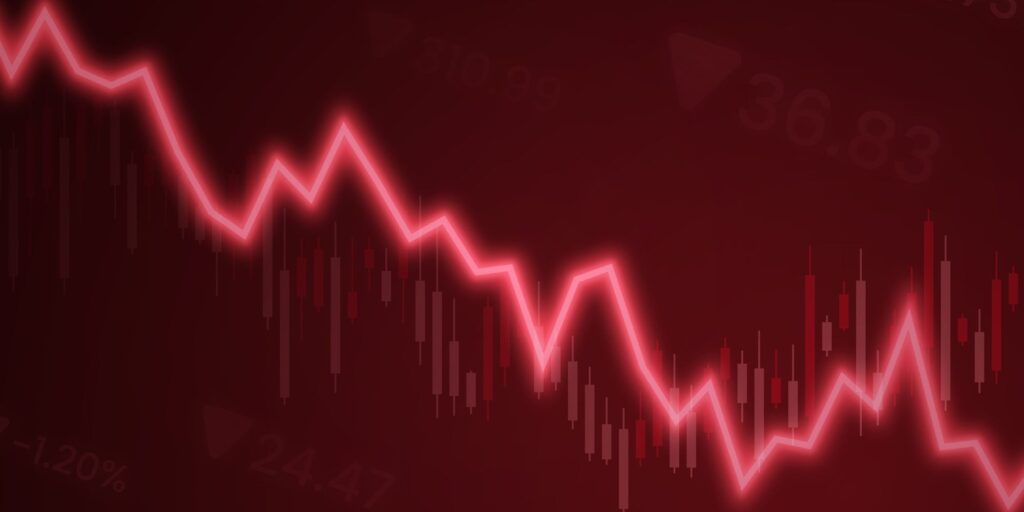- The S&P 500 is at risk of plunging 44% to around a four-year low, Paul Dietrich said.
- The top strategist explained that selling stocks well before they crash can yield outsized returns.
- Dietrich predicted a mild US recession this year based on multiple warning signs and threats.
The stock market may be headed for a 44% crash — and getting out early could pay off, Paul Dietrich said.
B. Riley Wealth Management's chief investment strategist moved his clients out of stocks and into bonds in 2000, and from stocks to cash, bonds, and gold in 2007, he recalled in his April market commentary.
Dietrich's clients missed out on massive run-ups in stocks over the next year or so. But they also escaped staggering blows from the ensuing collapses of the dot-com and housing bubbles.
They wound up netting 7% before fees during the 2000-2002 recession, when the S&P crashed by 49% and the Nasdaq plunged by 78%. They lost about 6% gross of fees during the 2008-2009 recession, but that performance trounced the S&P's 57% decline during the same period.
"Despite the fun and excitement of participation in the current Mardi Gras-like stock market bubble completely untethered to any stock fundamentals, suppose an investor could miss most of a 49% or 57% decline in the S&P 500 index and then get back into the stock market when the leading economic indicators and long-term moving averages indicate the recession is over," Dietrich said.
He emphasized that the "wildly overvalued" S&P would have to drop by 8% to return to its 200-day moving average, and the index has retreated by an average of 36% in past recessions.
Thus, Dietrich said the benchmark could suffer a 44% rout to about 2,800 points — a level it last touched at the height of the pandemic in 2020.
Dietrich also laid out why he still expects a mild recession this year. He pointed to heady stock valuations, charts flashing red, a historic jump in the so-called Buffett Indicator, the risk that interest rates stay higher for longer, and gold prices hitting record highs as signs that the market and economy are headed for trouble.
The Wall Street veteran added that the recession has been delayed by vast amounts of government spending, consumers racking up debt to make purchases, and a historically tight labor market that's showing signs of cracking.
Dietrich's latest warnings warrant skepticism, as the stock market and economy have defied his and other doomsayers' bleak forecasts for years now.
Moreover, famed investors like Warren Buffett have warned against trying to time the market as it's virtually impossible, and steadily investing or "dollar-cost averaging" into an index fund is a far superior strategy.
Yet several of Wall Street's biggest players, including JPMorgan CEO Jamie Dimon, Goldman Sachs CEO David Solomon, and Citigroup CEO Jane Fraser, have all cautioned that markets aren't pricing in the risks posed by threats like inflation, recession, and geopolitical strife.

